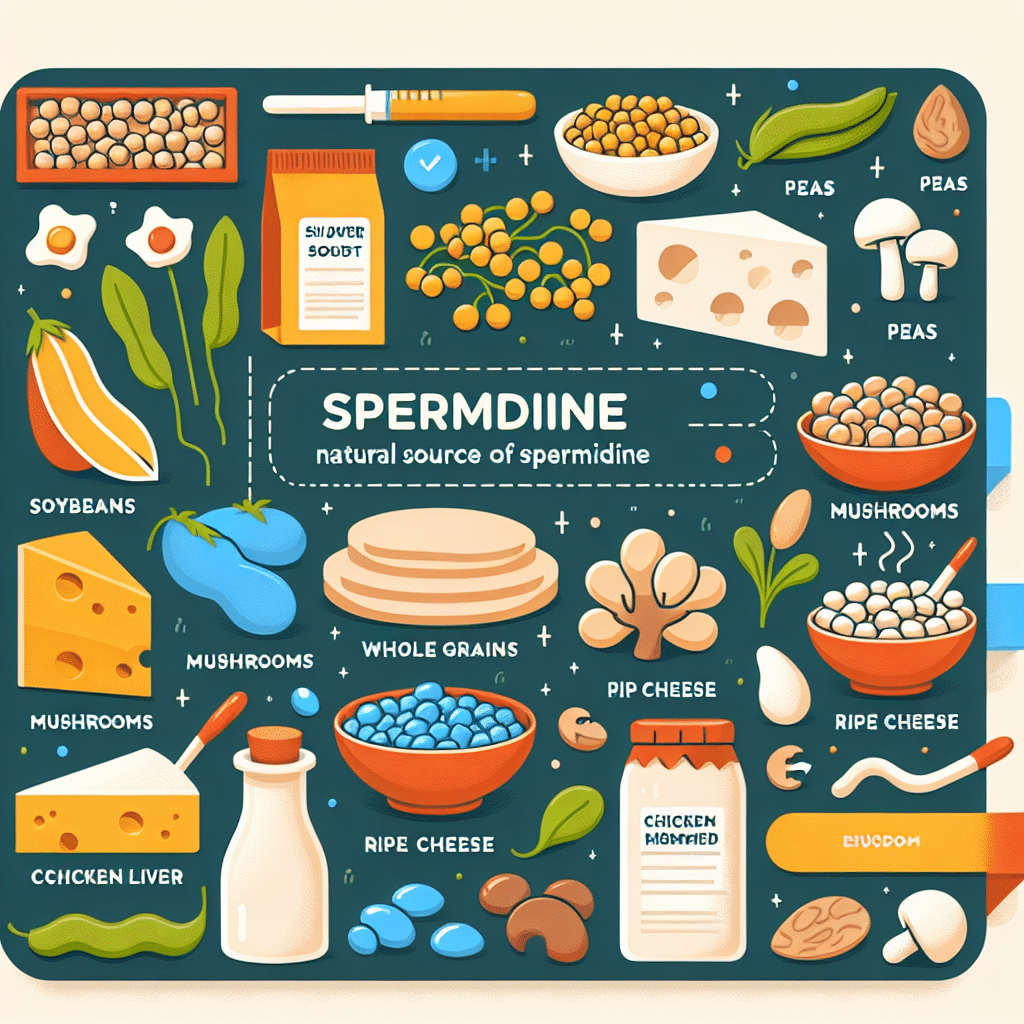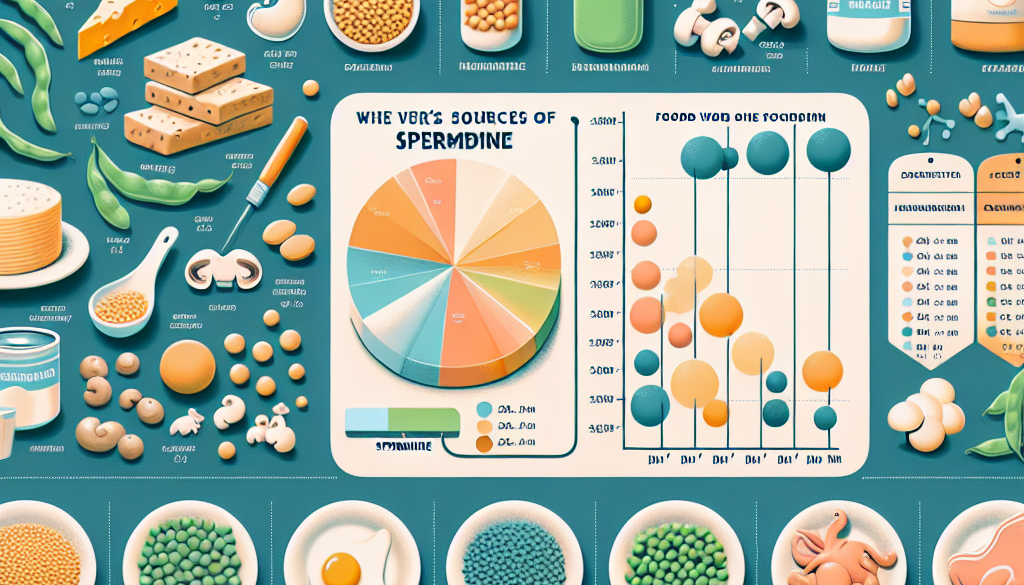Sources of Spermidine: Complete List
-
Table of Contents
- Spermidine-Rich Foods: Your Complete Guide to Dietary Sources
- Understanding Spermidine and Its Importance
- Plant-Based Sources of Spermidine
- Animal-Based Sources of Spermidine
- Fermented Foods and Beverages
- Supplements and Fortified Foods
- Maximizing Spermidine Intake Through Diet
- Research and Case Studies on Spermidine
- Conclusion: Embracing a Spermidine-Rich Diet
- Enhance Your Health with ETprotein’s Protein Products
Spermidine-Rich Foods: Your Complete Guide to Dietary Sources

Spermidine, a naturally occurring polyamine, has garnered significant attention in the scientific community for its potential health benefits, including promoting cellular renewal and potentially extending lifespan. This compound is found in a variety of foods, and understanding its sources can help individuals incorporate spermidine-rich foods into their diets. In this article, we will explore the complete list of dietary sources of spermidine, backed by research and studies.
Understanding Spermidine and Its Importance
Spermidine plays a crucial role in cellular processes such as cell growth, proliferation, and differentiation. It is also involved in autophagy, the body’s way of cleaning out damaged cells, which is essential for cellular rejuvenation and longevity. With its potential anti-aging properties, spermidine has become a compound of interest for those looking to maintain health and vitality.
Plant-Based Sources of Spermidine
Plant-based foods are excellent sources of spermidine, and incorporating a variety of these foods into your diet can help ensure adequate intake of this beneficial compound.
- Wheat Germ: Wheat germ is one of the richest sources of spermidine. It can be added to smoothies, yogurts, and salads for an extra boost.
- Mushrooms: Various types of mushrooms, including shiitake and oyster mushrooms, contain notable amounts of spermidine.
- Legumes: Beans, lentils, and soybeans are not only high in protein but also a good source of spermidine.
- Whole Grains: Whole grains such as quinoa, buckwheat, and barley contribute to spermidine intake.
- Nuts and Seeds: Nuts like almonds and seeds such as chia and flaxseeds contain spermidine, along with healthy fats and other nutrients.
- Green Vegetables: Leafy greens like spinach and broccoli are modest sources of spermidine and offer a range of other health benefits.
Animal-Based Sources of Spermidine
While plant-based foods are excellent sources of spermidine, certain animal-based foods also contribute to its dietary intake.
- Aged Cheese: Cheese, particularly aged varieties like blue cheese, cheddar, and brie, are known for their spermidine content.
- Chicken Liver: Organ meats such as chicken liver are rich in spermidine and other vital nutrients.
- Seafood: Fish and shellfish, including mackerel, tuna, and shrimp, provide spermidine along with omega-3 fatty acids.
Fermented Foods and Beverages
Fermentation can increase the spermidine content of foods, making fermented products valuable additions to a spermidine-rich diet.
- Natto: This traditional Japanese fermented soybean dish is particularly high in spermidine.
- Sauerkraut: Fermented cabbage is not only a source of probiotics but also contains spermidine.
- Miso: Miso, a fermented soybean paste, is commonly used in Japanese cuisine and is another good source of spermidine.
- Tempeh: This fermented soy product is a staple in vegetarian diets and contains spermidine.
Supplements and Fortified Foods
For those who may have difficulty incorporating enough spermidine-rich foods into their diets, supplements and fortified foods can be an alternative source.
- Spermidine Supplements: These are available in capsule or powder form and can provide a concentrated dose of spermidine.
- Fortified Foods: Some food manufacturers are beginning to fortify products with spermidine to enhance their nutritional profile.
Maximizing Spermidine Intake Through Diet
To maximize the benefits of spermidine, it is important to consume a varied diet that includes multiple sources of this compound. Here are some tips:
- Include a serving of whole grains, nuts, or seeds at each meal.
- Incorporate legumes into your diet several times a week.
- Enjoy fermented foods like natto or miso regularly.
- Choose aged cheeses as a source of spermidine and calcium.
- Consume a variety of vegetables, focusing on green leafy varieties.
Research and Case Studies on Spermidine
Several studies have highlighted the potential health benefits of spermidine. For instance, research published in the journal “Nature Medicine” suggests that spermidine may extend lifespan in yeast, flies, worms, and human immune cells. Another study in the “American Journal of Clinical Nutrition” found that higher dietary intake of spermidine is associated with lower mortality risk.
Conclusion: Embracing a Spermidine-Rich Diet
In conclusion, spermidine is a promising compound with potential health benefits that can be easily incorporated into your diet through a variety of foods. By focusing on plant-based sources, fermented foods, and certain animal products, individuals can enhance their spermidine intake and potentially reap the associated health rewards.
Enhance Your Health with ETprotein’s Protein Products
If you’re looking to complement your spermidine-rich diet with high-quality protein sources, ETprotein offers a range of organic bulk vegan proteins that can meet your needs. Their products, including organic rice protein, pea protein, and various seed proteins, are characterized by a neutral taste, non-GMO, and allergen-free attributes. Additionally, ETprotein’s L-(+)-Ergothioneine (EGT) supplements can further support your health and wellness goals.
About ETprotein:
ETprotein, a reputable protein and L-(+)-Ergothioneine (EGT) Chinese factory manufacturer and supplier, is renowned for producing, stocking, exporting, and delivering the highest quality organic bulk vegan proteins and L-(+)-Ergothioneine. They include Organic rice protein, clear rice protein, pea protein, clear pea protein, watermelon seed protein, pumpkin seed protein, sunflower seed protein, mung bean protein, peanut protein, and L-(+)-Ergothioneine EGT Pharmaceutical grade, L-(+)-Ergothioneine EGT food grade, L-(+)-Ergothioneine EGT cosmetic grade, L-(+)-Ergothioneine EGT reference grade and L-(+)-Ergothioneine EGT standard. Their offerings, characterized by a neutral taste, non-GMO, allergen-free attributes, with L-(+)-Ergothioneine purity over 98%, 99%, cater to a diverse range of industries. They serve nutraceutical, pharmaceutical, cosmeceutical, veterinary, as well as food and beverage finished product distributors, traders, and manufacturers across Europe, USA, Canada, Australia, Thailand, Japan, Korea, Brazil, and Chile, among others.
ETprotein specialization includes exporting and delivering tailor-made protein powder and finished nutritional supplements. Their extensive product range covers sectors like Food and Beverage, Sports Nutrition, Weight Management, Dietary Supplements, Health and Wellness Products, and Infant Formula, ensuring comprehensive solutions to meet all your protein needs.
As a trusted company by leading global food and beverage brands and Fortune 500 companies, ETprotein reinforces China’s reputation in the global arena. For more information or to sample their products, please contact them and email sales(at)ETprotein.com today.












